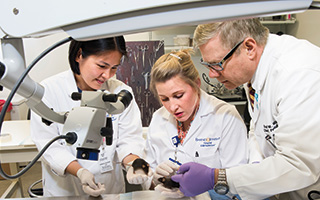Institutions join forces to treat rare conditions

At just four years of age, Cole Chrisco has faced more health challenges than most people face in a lifetime. Immediately after his birth at a suburban St. Louis hospital, Cole was diagnosed with a rare, life-threatening abnormality of the esophagus and transferred to St. Louis Children’s Hospital. There, surgeon Jacqueline Saito, MD, MSCI, performed a life-saving operation within his first 24 hours.
The condition she corrected was esophageal atresia/tracheoesophageal fistula (EA/TEF), in which the upper and lower esophagus do not meet, and the lower esophagus connects to the windpipe instead of the upper esophagus. In the four years since that initial surgery, Cole also has been treated for a heart condition, narrowing of the esophagus, an allergic/immune condition called eosinophilic esophagitis, and other serious medical issues. His recovery has been strong.
“He’s doing very well,” says Elizabeth Chrisco, Cole’s mother.
In treating patients such as Cole who have EA/TEF or other rare conditions, Saito draws not only from her surgical training and experience, but also from her participation in the Midwest Pediatric Surgical Consortium (MWPSC),* a group of 11 Midwestern academic medical centers focused on improving care of rare conditions through research. Saito and St. Louis Children’s are charter members.
In December 2016, the consortium published a retrospective study of 396 EA/TEF cases treated at member hospitals — the largest report of the condition to date. The study identified potential opportunities for improved care related to the use of nasogastric tubes during surgical treatment.
“This is a study that a single center would have difficulty performing in a meaningful way,” says Saito. “The consortium will compare four treatment approaches and monitor the outcomes in a future quality-improvement study.”
The MWPSC also is conducting clinical studies on management of collapsed lung, congenital cystic lung malformations and gastroschisis, a condition in which the bowel pushes through a hole in the abdominal wall.
In addition, it has funding from the Patient-Centered Outcomes Research Institute to study the costs and outcomes of a non-surgical treatment of acute appendicitis. The approach could represent an improved and more cost-efficient way to treat some patients.
*Other MWPSC centers are Children’s Hospital of Wisconsin, Children’s Mercy Kansas City, Cincinnati Children’s Hospital Medical Center, Indiana University, Nationwide Children’s Hospital, Northwestern University, University of Chicago, University of Louisville, University of Michigan and University of Wisconsin – Madison
Highlights

SAVING THE LIVES OF CHILDREN with short bowel syndrome (SBS) is one aim of the research lab of Division Chief Brad Warner, MD. SBS, characterized by a lack of functional small intestine, is fatal in 30 to 40 percent of cases, with 60 percent of those fatalities thought to result from liver disease — a major complication of SBS. Until recently, experts attributed this fatal complication to the intravenous feeding children with SBS receive. But Warner’s lab found that surgical intestine removal alone is a significant cause of liver disease in these patients and that oral antibiotics prevent liver injury. Their findings, published in the journal Surgery, open the door for using not only oral antibiotics but prebiotics, probiotics or fecal transplantation to help avert liver disease.
A TOP-TIER FELLOWSHIP program is the result of several steps taken over the past decade in the division, including obtaining American College of Surgeons (ACS) trauma verification, lining up top speakers for the Jessie Ternberg Visiting Professorship and preparing lab residents to present research findings at national meetings. In 2017, the pediatric surgery fellowship had 100 applicants for a single position.
JESSE VRECENAK, MD, joined the faculty after completing a pediatric surgery fellowship at Children’s Hospital of Philadelphia. She has established a basic science laboratory investigating hematopoietic stem cell transplantation, a treatment that could prevent blood diseases such as sickle cell anemia, thalassemia or spherocytosis. Vrecenak also will be the surgical director for the fetal care program.